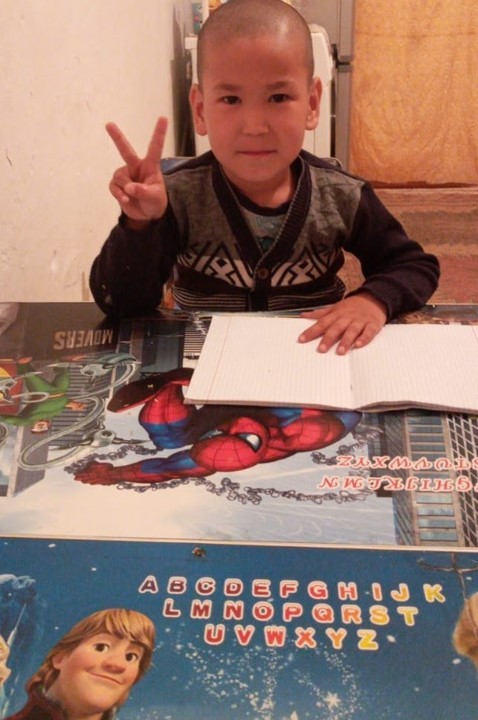Speeches Shim

Arman Dyusenbai was born in 2015. When he was six months old, his parents left him to be raised by his aunt, Shapagat Berzhigitova. At age two, Arman was diagnosed with chronic ear infections. As a result of the illness, Arman had a difficult time understanding speech and other sounds. He was unable to speak and is nearly deaf.
“His mother left, and his father went to live with another woman. His mother has not been in touch with us. Arman was left with me, but without any legal documents,” says Shapagat. “His health was getting worse with every passing month. He started to have tinnitus, and got dizzy and nauseous.”
There was no time to waste. Shapagat took Arman to a clinic, but they were unable to help him – he didn’t have the required documents. Shapagat immediately contacted Arman’s father to seek guardianship to help Arman. She wanted to take him to Nur-Sultan for treatment.
“Arman’s father gave me power of attorney, but it wasn’t enough. I simply didn’t have enough time to do it all. I need to earn money, prepare his documents, and give him the medical care he needs -- all by myself. And each day his health gets worse. I needed to apply for official guardianship as soon as possible, so that Arman and I could travel to Nur-Sultan for the surgery. But the application process in Kazakhstan is complex,”said Shapagat.
In Kazakhstan, as Shapagat learned, government agencies work independently from each other. People are required to appeal to multiple offices to apply for specific services or documents registration. This is time consuming.
Streamlining registration processes in Kazakhstan requires highly trained specialists that can provide comprehensive support to families in need. Integrated Special Social Service (ISSS) delivery, also known as the “One Window” system, has been shown to be the most effective approach to service provision. Within the ISSS system, specialists from the Departments of Public Health, Education, Social Protection – i.e. teachers, psychologists, and doctors – work together to coordinate the service delivery. This system is much easier for parents to navigate as they can receive the timely support needed without wading through long and complex bureaucratic barriers of separated services.
Through the Social Assistance to Children project, Public Charity Fund Children of the Aral Sea works with families to reduce the considerable social barriers and bureaucratic challenges of accessing the public services. Specifically, the civil society organization (CSO) developed pilot standards for the ISSS delivery in Kyzylorda Oblast, as well as coordinates the work of social service providers to ensure that they allocate sufficient time and resources to provide urgently needed support.
The CSO Children of the Aral Sea held an educational seminar on “Interdepartmental Engagement to Support the Delivery of Integrated Special Social Services to Children and Families in Difficult Life Situations,” supported by the USAID-supported Partnerships for Innovation Program.
Twenty specialists participated in the seminar, including representatives from the Departments of Social Protection, Education, Public Health, and Internal Affairs from four districts in the region. The participants are providers of special social services to diverse groups. Upon successful completion of the seminar, newly trained participants became members of their respective regional inter-agency commissions on the ISSS delivery to families in need.
Thanks to the adoption of ISSS, Children of the Aral Sea can provide individuals and families with access to a range of guaranteed social services and benefits.
“Thanks to the new model of social service delivery, I received the necessary documentation, went to court, and won custody. Finally, I was officially granted guardianship”, reports Shapagat. “After becoming his official guardian, Arman and I immediately went to Nur-Sultan. In October 2019, Arman underwent an operation for tympanoplasty [a surgical procedure to repair a hole in the eardrum].”
Arman recovered quickly. Now, Shapagat is working with specialists trained through the USAID-supported Partnerships for Innovation Program to register Arman for disability benefits.
“Arman is feeling better. He is gradually adapting to being with other people,” says Shapagat. “He’s found friends to play with in preschool. But most importantly, he watches cartoons and understands them, and he draws.”
Today little Arman is five years old, and has begun to live life to the fullest. His aunt takes him to Daryn preschool, where he is discovering a new world of sounds for himself. He has also been registered to receive housing benefits as a child without custodial parents. Arman is getting the help he needs to thrive and succeed.

Comment
Make a general inquiry or suggest an improvement.